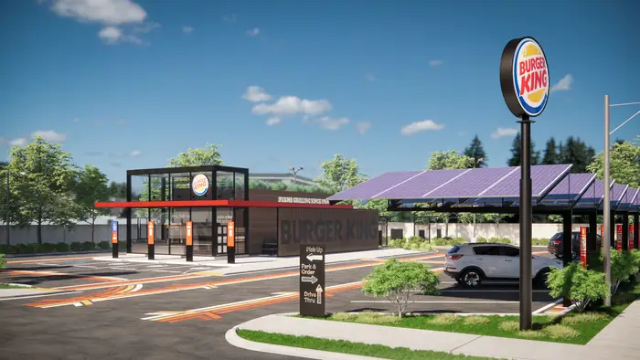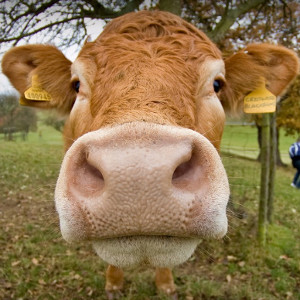Wired Magazine (of all publications) recently asked the rhetorical question: “Can the Burger Save the world?” Their answer was, “No, but the fast Food industry might.” Their in-depth article on the evolution of our food supply and its impact on greenhouse gasses posits some fascinating possibilities…
 The Fast Food resto of the future will be geared massively to pedestrian
The Fast Food resto of the future will be geared massively to pedestrian
walk-up and drive-thru service. The vehicles will be human and
electrically powered. The Burgers will be Plant-based.
Why fast Food?
One simple reason is, it’s the Fast Food sector that’s spearheading the development and marketing of new kinds of protein sources across the changing food-supply landscape these days. Would, say, Beyond Meat products have so quickly become universally known and so quickly have spawned so many competitors if the Fast Food Industry had nor given it such a promo boost?
Walking that one back a step, would the Fast Food players have sought out the fledgling Plant Protein makers so aggressively had they, the Fast Foodies, not been increasingly desperate for a replacement for conventionally raised Beef after being so savagely attacked by Animal Rights and Climate Change advocates over the past few years? Probably not.
How long do we have?
Some Save The World crusaders say it may be too late. Others say we can still head off massive climate damage and establi9sh workable, sustainable food supplies before millions or billions of people face starvation. WE were told 5 to 10 years ago that the deadline for substantive action was 2030. Now many say we can’t take the goal until 2040 or 2050. By then, in spite of what has been done and the acceleration of positive action over the past few years, we’re being warned that we’re still running neck-and-neck with global disaster.
What’s the Beef story?
Perhaps the western world’s runaway favourite animal protein choice, accoding to the Wired article, … “a typical quarter-pound burger requires 15 gallons of water and 13 pounds of feed, and comes with a 4-pound carbon hoofprint. Drive past any feedlot, and the smell alone will warn you it’s no beacon of sustainability. To keep agriculture within planetary limits, beef has to go.”
On the other hand, “On average, Americans eat 57 pounds of beef every year. With a century of experience tailoring food to people’s taste buds and wallets, fast food has turned burgers into a national cuisine—something rich and poor, left and right, coastal and flyover all agree is as tasty as it is all-American. No wonder people freaked out when they assumed a Green New Deal would take their burgers away. The burger is the food system and climate politics ground down to their mouth-watering essence: democratic, delicious, and deadly.”
Contrast that with Plant Protein…
“Fast food’s strengths—its low price, wide availability, and industrially engineered appeal—could help overpower our beef addiction,” the Wired story asserts. “The thing about fast food today is that it’s not inherently worse than the conventional, mass-produced food available at most restaurants and supermarkets. It’s just more efficient.”
“With billions served every year, even small per-unit reductions in environmental harms add up to massive impacts. Big changes like replacing beef with plant-based alternatives would be a game-changer.”
Drawbacks still stand in the way
Drawbacks still stand in the way of true, mass-industry deployment of Plant Protein Meat substitutes. But as production continues to ramp up and more consumers are exposed to the products, we can expect prices to moderate and even more consumers to ‘sign on’ to the non-Real Meat pledge.
How long that might take may depend on how long it takes the Fast Food sector to phase out Real Meat to serve its own purposes, including saving money on raw materials and simplifying its own procedures and protocols. What about consumers? Remember the initially big uproar over ‘Pink Slime’ being used as the ‘base’ for Fast Food menu items like Chicken Nuggets and so on,? It blew over so fast (in terms of the big picture and the march of history) that the only lasting results were a slew of Pink Slime Jokes and a huge amount of promotional coverage which producers that Fast Food pushers could never have afforded to buy.
By, say, 2035, we’ll be into yet another generation of Fast Food-addicted kids; an audience who never knew Real Meat Burgers or other products.
How is Fast Food sitting in?
The Wired story points out that change is already on the way… “Sales of plant-based meat have jumped more than 200 percent and have outpaced meat sales since the start of the Covid-19 pandemic. As sales projections ramp up, costs have decreased, with companies like Beyond Meat—now expected to pull in $1 billion in sales by the year’s end—looking to compete on price with traditional beef burgers. Meanwhile, the pandemic has shown industrial farming and slaughter to be a fragile value chain prone to disruption and dangerous for workers, and has convinced some that it’s a bad investment. As consumers increasingly view meat as a ‘dirty’ industry alongside tobacco, coal, petroleum, and mining, a rapid and large-scale shift to alternative proteins could be the escape hatch the fast-food industry desperately needs.”
No silver Bullet
As with most scientific and other breakthroughs, Plant Protein is far from a silver bullet to solve the Great Global Sustainability Challenge. But, “…if every burger eaten in the USA were replaced with an Impossible burger, that would require about 90 percent less land and water while reducing GHG emissions by 90 percent.”
Which means that Fast Food’s adoption of Plant-based Protein can at least buy us some much-needed time.
Thanks again…
… To Wired Magazine for their excellent, comprehensive article on the future of Fast Food and sustainability.
~ Maggie J.

